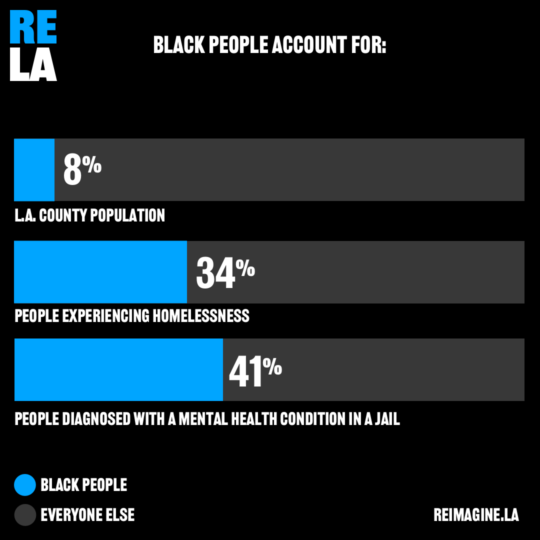At its meeting Tuesday, the L.A. County Board of Supervisors voted to approve several items that could have far-reaching impacts on the quality of life for L.A. County residents, especially Blacks and other disadvantaged communities of color. The county approved the first reading of the Reimagine L.A. County initiative motion that gives L.A. County voters a choice to shift some county funding away from law enforcement and into services and programs for under-resourced communities. At the same meeting, the supervisors also approved measures to develop an antiracist L.A. County policy agenda, and to extend a temporary eviction moratorium and legal support for low-income immigrants at risk of deportation.
If passed by voters in November, the Reimagine L.A. County initiative would shift 10 percent of unrestricted county general funds away from the law enforcement system and toward various programs serving low-income communities, such as:
- youth development programs
- job training and jobs to low-income residents focusing on jobs that support the implementation of the “Alternatives to Incarceration” workgroup recommendations, especially construction jobs for the expansion of affordable and supportive housing, and a decentralized system of care
- access to capital for small minority-owned businesses, with a focus on Black-owned businesses
- rent assistance, housing vouchers and accompanying supportive services to those at-risk of losing their housing, or without stable housing
- capital funding for transitional housing, affordable housing, and supportive housing
- alternatives to incarceration, including community-based restorative justice programs, pre-trial non-custody services and treatment; and community-based health services, health promotion, counseling, wellness and prevention programs, and mental health and substance use disorder services
Further details on the proposal are available via the meeting agenda (item 51-C) or the Reimagine L.A. Coalition website.
Public testimony was split on the initiative. Opponents criticized the measure as a "poorly-conceived knee-jerk" response to recent Black Lives Matter protests. Proponents praised it as a chance to align the county budget with the county's values.
After public comment, L.A. County Sheriff Alex Villanueva spoke against the ReImagine L.A. initiative. He closed stating "when the wolf convinces the sheep that the sheepdog is the problem, we're all in trouble." Villanueva is quoting an analogy pushed by problematic policing trainer Dave Grossman. Grossman travels the country advocating for militarized policing: a “warrior mindset” - being mentally prepared to kill at any moment.
After the item was approved Villanueva tweeted that the Reimagine L.A. initiative - a ten percent shift - would make "your streets look like a scene from Mad Max."
The @LACountyBOS just pushed forward agenda item 51-C, advancing the campaign to cont. defunding @LASDHQ & change public safety forever. Do YOU share their opinions? If you don’t want your streets to look like a scene from Mad Max, use your VOICE to tell the board what you think pic.twitter.com/Rzzh9nGo6l
— Alex Villanueva (@LACoSheriff_33) July 21, 2020
County legal and fiscal administrators advised the supervisors against approving the motion. County counsel asserted that the initiative "might not survive a legal challenge" but declined to clarify further.
This sort of charter amendment motion requires a two-step approval process - a first and second reading - before going to the voters. On Tuesday, the board of supervisors approved the initial reading on a vote of 4-1, with the motion's sponsors Hilda Solis and Sheila Kuehl joined by Supervisors Mark Ridley-Thomas and Janice Hahn. Kathryn Barger was the sole vote in opposition. If the second reading is approved, the proposal goes before L.A. County voters on November 3rd. If passed the budget shift would be phased in through 2024.
The supervisors also approved a Ridley Thomas motion (item 3) to establish an antiracist L.A. County policy agenda. The motion directs county departments to:
- evaluate existing County policies, practices, operations and programs to promote and support policies that prioritize physical and mental health, housing, employment, public safety and justice in an equitable way for African Americans
- assess existing policies, processes and practices that may prevent African Americans from advancing within County Departmental career ladders and develop procedures that best advance and sustain Countywide and Departmental equity commitments
- advance strategies and recommendations put forward by the Ad Hoc Committee for Black People Experiencing Homelessness
- produce an annual report on the State of Black Los Angeles County with a focus on outcomes for African Americans in the areas of physical and mental health, education, employment, law enforcement, justice, housing and homelessness - including an annual assessment of outcomes and progress with defined benchmarks and objectives
In addition the supervisors approved motions:
- extending the current COVID-19 crisis eviction moratorium (item 8) through September 30. The moratorium serves as a baseline protection for all residents in all L.A. County cities, but does not preclude other cities from enacting their own stronger measures
- extending the current L.A. Justice Fund (LAJF) pilot (item 20) providing legal support for low-income immigrants at risk of deportation






